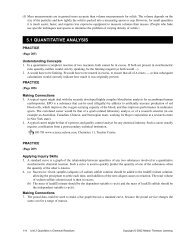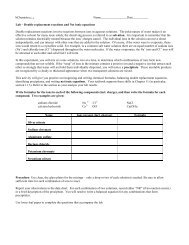Business and Personal Finance Unit 4 Chapter 14 © 2007 ... - Quia
Business and Personal Finance Unit 4 Chapter 14 © 2007 ... - Quia
Business and Personal Finance Unit 4 Chapter 14 © 2007 ... - Quia
Create successful ePaper yourself
Turn your PDF publications into a flip-book with our unique Google optimized e-Paper software.
<strong>Business</strong> <strong>and</strong> <strong>Personal</strong> <strong>Finance</strong> <strong>Unit</strong> 4 <strong>Chapter</strong> <strong>14</strong> © <strong>2007</strong> Glencoe/McGraw-Hill<br />
0
<strong>Chapter</strong> <strong>14</strong><br />
Health, Disability, <strong>and</strong> Life Insurance<br />
What You’ll Learn<br />
• Section <strong>14</strong>.1<br />
• Explain the importance of health insurance in financial<br />
planning.<br />
• Analyze costs <strong>and</strong> benefits of various health insurance.<br />
• Section <strong>14</strong>.2<br />
• Differentiate between private <strong>and</strong> government health care<br />
plans.<br />
• Section <strong>14</strong>.3<br />
• Explain the importance of disability insurance in financial<br />
planning.<br />
• Describe different sources of disability income.<br />
• Section <strong>14</strong>.4<br />
• Describe various types of life insurance coverage.<br />
• Identify the key provisions in a life insurance policy.<br />
<strong>Business</strong> <strong>and</strong> <strong>Personal</strong> <strong>Finance</strong> <strong>Unit</strong> 4 <strong>Chapter</strong> <strong>14</strong> © <strong>2007</strong> Glencoe/McGraw-Hill<br />
1
Health Care Costs<br />
• Q: I am a high school student. Why should I be concerned<br />
about my future health care costs now?<br />
• A: Your health care costs, now <strong>and</strong> in the future, can be<br />
affected by your personal health habits. Many health<br />
problems result from poor habits, such as lack of exercise<br />
or inadequate diet, <strong>and</strong> may take years to develop. By<br />
establishing good habits now, you can reduce the<br />
likelihood of future health problems <strong>and</strong> related expenses.<br />
Go to finance07.glencoe.com to complete the St<strong>and</strong>ard &<br />
Poor’s Financial Focus activity.<br />
<strong>Business</strong> <strong>and</strong> <strong>Personal</strong> <strong>Finance</strong> <strong>Unit</strong> 4 <strong>Chapter</strong> <strong>14</strong> © <strong>2007</strong> Glencoe/McGraw-Hill<br />
2
Section <strong>14</strong>.1<br />
Health Insurance <strong>and</strong> Financial Planning<br />
What does major<br />
medical expense<br />
insurance cover?<br />
Main Idea<br />
Knowing how to determine the type of health<br />
insurance plan that you need can help you meet<br />
your financial goals even when dealing with<br />
unexpected medical costs.<br />
<strong>Business</strong> <strong>and</strong> <strong>Personal</strong> <strong>Finance</strong> <strong>Unit</strong> 4 <strong>Chapter</strong> <strong>14</strong> © <strong>2007</strong> Glencoe/McGraw-Hill<br />
3
Section <strong>14</strong>.1<br />
Health Insurance <strong>and</strong> Financial Planning<br />
health insurance<br />
a form of<br />
protection that<br />
eases the<br />
financial burden<br />
people may<br />
experience as a<br />
result of illness or<br />
injury<br />
What Is Health Insurance?<br />
Health insurance plans vary, but some of the<br />
things that they might cover are:<br />
• Hospital stays<br />
• Doctors’ visits<br />
• Medications<br />
• Vision <strong>and</strong> dental care<br />
<strong>Business</strong> <strong>and</strong> <strong>Personal</strong> <strong>Finance</strong> <strong>Unit</strong> 4 <strong>Chapter</strong> <strong>14</strong> © <strong>2007</strong> Glencoe/McGraw-Hill<br />
4
Section <strong>14</strong>.1<br />
Health Insurance <strong>and</strong> Financial Planning<br />
Group Health Insurance<br />
Most people who have health insurance are<br />
covered under group plans. These plans may be<br />
offered by:<br />
• Employers<br />
• Labor unions<br />
• Professional associations<br />
Group insurance plans cover you <strong>and</strong> your<br />
immediate family.<br />
<strong>Business</strong> <strong>and</strong> <strong>Personal</strong> <strong>Finance</strong> <strong>Unit</strong> 4 <strong>Chapter</strong> <strong>14</strong> © <strong>2007</strong> Glencoe/McGraw-Hill<br />
5
Section <strong>14</strong>.1<br />
Health Insurance <strong>and</strong> Financial Planning<br />
Individual Health Insurance<br />
You may want to choose an individual health<br />
insurance plan if:<br />
• You are not offered an employersponsored<br />
group insurance plan.<br />
• You are self-employed.<br />
• You are dissatisfied with the coverage<br />
that the group plans provide.<br />
You can buy individual health insurance directly<br />
from the company of your choice.<br />
<strong>Business</strong> <strong>and</strong> <strong>Personal</strong> <strong>Finance</strong> <strong>Unit</strong> 4 <strong>Chapter</strong> <strong>14</strong> © <strong>2007</strong> Glencoe/McGraw-Hill<br />
6
Section <strong>14</strong>.1<br />
Health Insurance <strong>and</strong> Financial Planning<br />
COBRA<br />
The Consolidated Omnibus Budget<br />
Reconciliation Act of 1986, known as COBRA,<br />
allows an employee who loses his or her job to<br />
keep the former employer’s group coverage for<br />
a set period of time.<br />
Not everyone qualifies for COBRA. In order to<br />
be eligible for the benefits, you have to work for:<br />
• A private company<br />
• A state or local government<br />
<strong>Business</strong> <strong>and</strong> <strong>Personal</strong> <strong>Finance</strong> <strong>Unit</strong> 4 <strong>Chapter</strong> <strong>14</strong> © <strong>2007</strong> Glencoe/McGraw-Hill<br />
7
Section <strong>14</strong>.1<br />
Health Insurance <strong>and</strong> Financial Planning<br />
Types of Health Insurance Coverage<br />
Several types of health insurance coverage are<br />
available, either through:<br />
• A group plan<br />
• Individual purchase<br />
Some benefits are included in nearly every<br />
health insurance plan; other benefits are less<br />
common.<br />
<strong>Business</strong> <strong>and</strong> <strong>Personal</strong> <strong>Finance</strong> <strong>Unit</strong> 4 <strong>Chapter</strong> <strong>14</strong> © <strong>2007</strong> Glencoe/McGraw-Hill<br />
8
Section <strong>14</strong>.1<br />
Health Insurance <strong>and</strong> Financial Planning<br />
Basic Health Insurance Coverage<br />
Basic health insurance coverage includes:<br />
• Hospital expense coverage<br />
• Surgical expense coverage<br />
• Physician expense coverage<br />
<strong>Business</strong> <strong>and</strong> <strong>Personal</strong> <strong>Finance</strong> <strong>Unit</strong> 4 <strong>Chapter</strong> <strong>14</strong> © <strong>2007</strong> Glencoe/McGraw-Hill<br />
9
Section <strong>14</strong>.1<br />
Health Insurance <strong>and</strong> Financial Planning<br />
coinsurance<br />
the percentage of<br />
the medical<br />
expenses the<br />
policyholder must<br />
pay in addition to<br />
the deductible<br />
amount<br />
Major Medical Expense Insurance<br />
Major medical expense insurance pays the large<br />
costs involved in:<br />
• Long hospital stays<br />
• Multiple surgeries<br />
To keep premiums lower, most major medical<br />
plans require a deductible or include a<br />
coinsurance provision.<br />
<strong>Business</strong> <strong>and</strong> <strong>Personal</strong> <strong>Finance</strong> <strong>Unit</strong> 4 <strong>Chapter</strong> <strong>14</strong> © <strong>2007</strong> Glencoe/McGraw-Hill<br />
10
Section <strong>14</strong>.1<br />
Health Insurance <strong>and</strong> Financial Planning<br />
stop-loss<br />
provision<br />
a provision that<br />
requires the<br />
policyholder to<br />
pay all costs up to<br />
a certain amount,<br />
after which the<br />
insurance<br />
company pays<br />
100 percent of the<br />
remaining<br />
expenses covered<br />
in the policy<br />
Stop-Loss Provisions<br />
Some major medical policies contain a stop-loss<br />
provision.<br />
Typically, the policyholder will pay between<br />
$3,000 <strong>and</strong> $5,000 in out-of-pocket expenses<br />
before the coverage begins.<br />
<strong>Business</strong> <strong>and</strong> <strong>Personal</strong> <strong>Finance</strong> <strong>Unit</strong> 4 <strong>Chapter</strong> <strong>14</strong> © <strong>2007</strong> Glencoe/McGraw-Hill<br />
11
Section <strong>14</strong>.1<br />
Health Insurance <strong>and</strong> Financial Planning<br />
Hospital Indemnity Policies<br />
A hospital indemnity policy pays benefits when<br />
you are hospitalized. Under these policies, you<br />
are paid in cash, which you can spend on<br />
medical or nonmedical expenses as you<br />
choose.<br />
The average person who buys such a policy<br />
usually pays much more in premiums than he or<br />
she receives in payments.<br />
<strong>Business</strong> <strong>and</strong> <strong>Personal</strong> <strong>Finance</strong> <strong>Unit</strong> 4 <strong>Chapter</strong> <strong>14</strong> © <strong>2007</strong> Glencoe/McGraw-Hill<br />
12
Fitness Fun<br />
Expensive exercise clothes may look good, but they usually<br />
do not improve your workout. If you cannot afford to pay to<br />
join a health club, you can get your exercise by walking or<br />
jogging in your neighborhood or at your school’s track.<br />
How can staying fit save you money?<br />
<strong>Business</strong> <strong>and</strong> <strong>Personal</strong> <strong>Finance</strong> <strong>Unit</strong> 4 <strong>Chapter</strong> <strong>14</strong> © <strong>2007</strong> Glencoe/McGraw-Hill<br />
13<br />
13
Section <strong>14</strong>.1<br />
Health Insurance <strong>and</strong> Financial Planning<br />
Dental Expense Insurance<br />
Dental expense insurance provides<br />
policyholders reimbursement for the expenses<br />
of:<br />
• Dental services<br />
• Supplies<br />
Some dental expense policies do not cover X-<br />
rays <strong>and</strong> cleanings.<br />
<strong>Business</strong> <strong>and</strong> <strong>Personal</strong> <strong>Finance</strong> <strong>Unit</strong> 4 <strong>Chapter</strong> <strong>14</strong> © <strong>2007</strong> Glencoe/McGraw-Hill<br />
<strong>14</strong>
Section <strong>14</strong>.1<br />
Health Insurance <strong>and</strong> Financial Planning<br />
Vision Care Insurance<br />
Many insurance companies offer vision care<br />
insurance as part of group plans. Vision care<br />
insurance may cover:<br />
• Eye examinations<br />
• Glasses<br />
• Contact lenses<br />
• Eye surgery<br />
• Treatment of eye diseases<br />
<strong>Business</strong> <strong>and</strong> <strong>Personal</strong> <strong>Finance</strong> <strong>Unit</strong> 4 <strong>Chapter</strong> <strong>14</strong> © <strong>2007</strong> Glencoe/McGraw-Hill<br />
15
Section <strong>14</strong>.1<br />
Health Insurance <strong>and</strong> Financial Planning<br />
Dread Disease Policies<br />
Dread disease, trip accident, death insurance,<br />
<strong>and</strong> cancer policies are usually sold:<br />
• Through the mail<br />
• In newspapers<br />
• In magazines<br />
These policies play upon unrealistic fears, <strong>and</strong><br />
they are illegal in many states.<br />
<strong>Business</strong> <strong>and</strong> <strong>Personal</strong> <strong>Finance</strong> <strong>Unit</strong> 4 <strong>Chapter</strong> <strong>14</strong> © <strong>2007</strong> Glencoe/McGraw-Hill<br />
16
Section <strong>14</strong>.1<br />
Health Insurance <strong>and</strong> Financial Planning<br />
Long-Term Care Insurance<br />
Long-term care insurance provides coverage for<br />
the expense of daily help that you may need if<br />
you:<br />
• Become seriously ill or disabled<br />
• Are unable to care for yourself<br />
<strong>Business</strong> <strong>and</strong> <strong>Personal</strong> <strong>Finance</strong> <strong>Unit</strong> 4 <strong>Chapter</strong> <strong>14</strong> © <strong>2007</strong> Glencoe/McGraw-Hill<br />
17
Section <strong>14</strong>.1<br />
Health Insurance <strong>and</strong> Financial Planning<br />
co-payment<br />
a flat fee that you<br />
pay every time<br />
you receive a<br />
covered service<br />
Major Provisions in a Health<br />
Insurance Policy<br />
The following provisions are included in most<br />
health insurance policies:<br />
• Eligibility<br />
• Assigned benefits<br />
• Internal limits<br />
• Co-payment<br />
• Service benefits<br />
• Exclusions <strong>and</strong> limitations<br />
<strong>Business</strong> <strong>and</strong> <strong>Personal</strong> <strong>Finance</strong> <strong>Unit</strong> 4 <strong>Chapter</strong> <strong>14</strong> © <strong>2007</strong> Glencoe/McGraw-Hill<br />
18
Section <strong>14</strong>.1<br />
Health Insurance <strong>and</strong> Financial Planning<br />
Choosing Coverage<br />
The type of coverage you choose will be<br />
affected by:<br />
• The amount you can afford to spend on<br />
the premiums<br />
• The level of benefits that you feel you<br />
want <strong>and</strong> need<br />
• The kind of coverage your employer<br />
offers<br />
Ideally, you should get a basic plan <strong>and</strong> a major<br />
medical supplement.<br />
<strong>Business</strong> <strong>and</strong> <strong>Personal</strong> <strong>Finance</strong> <strong>Unit</strong> 4 <strong>Chapter</strong> <strong>14</strong> © <strong>2007</strong> Glencoe/McGraw-Hill<br />
19
Section <strong>14</strong>.1<br />
Health Insurance <strong>and</strong> Financial Planning<br />
Health Insurance Trade-Offs<br />
As you decide which insurance plan to buy, you<br />
should consider the following trade-offs:<br />
• Reimbursement versus indemnity<br />
• Internal limits versus aggregate limits<br />
• Deductibles <strong>and</strong> coinsurance<br />
• Out-of-pocket limits<br />
• Benefits based on reasonable <strong>and</strong><br />
customary charges<br />
<strong>Business</strong> <strong>and</strong> <strong>Personal</strong> <strong>Finance</strong> <strong>Unit</strong> 4 <strong>Chapter</strong> <strong>14</strong> © <strong>2007</strong> Glencoe/McGraw-Hill<br />
20
<strong>Business</strong> <strong>and</strong> <strong>Personal</strong> <strong>Finance</strong> <strong>Unit</strong> 4 <strong>Chapter</strong> <strong>14</strong> © <strong>2007</strong> Glencoe/McGraw-Hill<br />
21
Section <strong>14</strong>.2<br />
Private <strong>and</strong> Government Plans<br />
What is the<br />
difference<br />
between<br />
insurance<br />
provided by<br />
private<br />
organizations <strong>and</strong><br />
insurance<br />
provided by the<br />
government?<br />
Main Idea<br />
Underst<strong>and</strong>ing plans offered by private<br />
companies <strong>and</strong> by the government will help you<br />
choose the plan that best meets your physical<br />
<strong>and</strong> financial needs now <strong>and</strong> as you get older.<br />
<strong>Business</strong> <strong>and</strong> <strong>Personal</strong> <strong>Finance</strong> <strong>Unit</strong> 4 <strong>Chapter</strong> <strong>14</strong> © <strong>2007</strong> Glencoe/McGraw-Hill<br />
22
Section <strong>14</strong>.2<br />
Private <strong>and</strong> Government Plans<br />
Private Health Care Plans<br />
Private health care plans may be offered by a<br />
number of sources:<br />
• Private insurance companies<br />
• Hospital <strong>and</strong> medical service plans<br />
• Health maintenance organizations<br />
• Preferred provider organizations<br />
• Home health care agencies<br />
• Employer self-funded health plans<br />
<strong>Business</strong> <strong>and</strong> <strong>Personal</strong> <strong>Finance</strong> <strong>Unit</strong> 4 <strong>Chapter</strong> <strong>14</strong> © <strong>2007</strong> Glencoe/McGraw-Hill<br />
23
Section <strong>14</strong>.2<br />
Private <strong>and</strong> Government Plans<br />
Private Insurance Companies<br />
Private insurance companies provide health<br />
plans mainly to employers, who in turn offer<br />
them to their employees as an employment<br />
benefit.<br />
These policies typically pay for medical costs by<br />
sending payments directly to the doctor,<br />
hospital, or lab that provides the services.<br />
<strong>Business</strong> <strong>and</strong> <strong>Personal</strong> <strong>Finance</strong> <strong>Unit</strong> 4 <strong>Chapter</strong> <strong>14</strong> © <strong>2007</strong> Glencoe/McGraw-Hill<br />
24
Section <strong>14</strong>.2<br />
Private <strong>and</strong> Government Plans<br />
Blue Cross<br />
an insurance<br />
company that<br />
provides hospital<br />
care benefits<br />
Blue Shield<br />
an insurance<br />
company that<br />
provides benefits<br />
for surgical <strong>and</strong><br />
medical services<br />
performed by<br />
physicians<br />
Hospital <strong>and</strong> Medical Service Plans<br />
Blue Cross <strong>and</strong> Blue Shield are statewide<br />
organizations similar to private health insurance<br />
companies.<br />
The “Blues” provide health insurance to millions<br />
of Americans.<br />
<strong>Business</strong> <strong>and</strong> <strong>Personal</strong> <strong>Finance</strong> <strong>Unit</strong> 4 <strong>Chapter</strong> <strong>14</strong> © <strong>2007</strong> Glencoe/McGraw-Hill<br />
25
Section <strong>14</strong>.2<br />
Private <strong>and</strong> Government Plans<br />
managed care<br />
prepaid health<br />
plans that provide<br />
comprehensive<br />
health care to<br />
their members<br />
Managed Care<br />
According to a recent industry survey, 23<br />
percent of employed Americans are enrolled in<br />
some form of managed care, due to rising health<br />
care costs.<br />
Managed care is offered by:<br />
• Health maintenance organizations<br />
(HMOs)<br />
• Preferred provider organizations (PPOs)<br />
• Point-of-service plans (POSs)<br />
<strong>Business</strong> <strong>and</strong> <strong>Personal</strong> <strong>Finance</strong> <strong>Unit</strong> 4 <strong>Chapter</strong> <strong>14</strong> © <strong>2007</strong> Glencoe/McGraw-Hill<br />
26
PROMOTING HEALTH HMOs are based on the idea that<br />
preventive services will minimize future medical problems.<br />
What kinds of preventive services do HMOs offer?<br />
<strong>Business</strong> <strong>and</strong> <strong>Personal</strong> <strong>Finance</strong> <strong>Unit</strong> 4 <strong>Chapter</strong> <strong>14</strong> © <strong>2007</strong> Glencoe/McGraw-Hill<br />
27
Section <strong>14</strong>.2<br />
Private <strong>and</strong> Government Plans<br />
health<br />
maintenance<br />
organizations<br />
(HMO)<br />
a health insurance<br />
plan that contracts<br />
with selected<br />
physicians <strong>and</strong><br />
other medical<br />
professionals to<br />
provide health<br />
care services in<br />
exchange for a<br />
fixed, prepaid<br />
monthly premium<br />
Health Maintenance Organizations<br />
One managed-care option is a health<br />
maintenance organization (HMO). HMOs<br />
typically cover:<br />
• Routine immunizations <strong>and</strong> checkups<br />
• Screening programs<br />
• Diagnostic tests<br />
They also provide customers with coverage for<br />
surgery, hospitalization, <strong>and</strong> emergency care.<br />
<strong>Business</strong> <strong>and</strong> <strong>Personal</strong> <strong>Finance</strong> <strong>Unit</strong> 4 <strong>Chapter</strong> <strong>14</strong> © <strong>2007</strong> Glencoe/McGraw-Hill<br />
28
Section <strong>14</strong>.2<br />
Private <strong>and</strong> Government Plans<br />
preferred<br />
provider<br />
organization<br />
(PPO)<br />
a group of doctors<br />
<strong>and</strong> hospitals that<br />
agree to provide<br />
specified medical<br />
services to<br />
members at<br />
prearranged fees<br />
Preferred Provider Organizations<br />
A variation on the HMO is a preferred provider<br />
organization (PPO).<br />
While HMOs require members to receive care<br />
from HMO providers only, PPOs allow members<br />
greater flexibility.<br />
<strong>Business</strong> <strong>and</strong> <strong>Personal</strong> <strong>Finance</strong> <strong>Unit</strong> 4 <strong>Chapter</strong> <strong>14</strong> © <strong>2007</strong> Glencoe/McGraw-Hill<br />
29
Section <strong>14</strong>.2<br />
Private <strong>and</strong> Government Plans<br />
point-of-service<br />
(POS) plan<br />
a health insurance<br />
plan that<br />
combines features<br />
of both HMOs <strong>and</strong><br />
PPOs<br />
Point-of-Service (POS) Plan<br />
A point-of-service (POS) plan combines features<br />
of both HMOs <strong>and</strong> PPOs.<br />
As with an HMO, you choose a plan physician<br />
who:<br />
• Manages your care<br />
• Controls referrals to specialists<br />
You are allowed to seek care outside the<br />
network at a higher charge, as with a PPO.<br />
<strong>Business</strong> <strong>and</strong> <strong>Personal</strong> <strong>Finance</strong> <strong>Unit</strong> 4 <strong>Chapter</strong> <strong>14</strong> © <strong>2007</strong> Glencoe/McGraw-Hill<br />
30
Section <strong>14</strong>.2<br />
Private <strong>and</strong> Government Plans<br />
Home Health Care Agencies<br />
Home care has become one of the fastestgrowing<br />
areas of the health care industry, due<br />
to:<br />
• Rising hospital costs<br />
• New medical technology<br />
• The increasing number of elderly people<br />
Home health care providers offer medical care<br />
in a home setting in agreement with a medical<br />
order, often at a fraction of the cost charged by<br />
hospitals for similar services.<br />
<strong>Business</strong> <strong>and</strong> <strong>Personal</strong> <strong>Finance</strong> <strong>Unit</strong> 4 <strong>Chapter</strong> <strong>14</strong> © <strong>2007</strong> Glencoe/McGraw-Hill<br />
31
Section <strong>14</strong>.2<br />
Private <strong>and</strong> Government Plans<br />
Employer Self-Funded Health Plans<br />
Some companies choose to self-insure. A<br />
company that runs its own insurance plan:<br />
• Collects premiums from employees<br />
• Pays medical benefits as needed<br />
• Must cover any costs that exceed the<br />
income from premiums<br />
<strong>Business</strong> <strong>and</strong> <strong>Personal</strong> <strong>Finance</strong> <strong>Unit</strong> 4 <strong>Chapter</strong> <strong>14</strong> © <strong>2007</strong> Glencoe/McGraw-Hill<br />
32
Section <strong>14</strong>.2<br />
Private <strong>and</strong> Government Plans<br />
Government Health Care Programs<br />
Some consumers are eligible for health<br />
insurance coverage under programs offered by<br />
federal <strong>and</strong> state governments.<br />
The federal program is Medicare, <strong>and</strong> the<br />
federal <strong>and</strong> state program is Medicaid.<br />
<strong>Business</strong> <strong>and</strong> <strong>Personal</strong> <strong>Finance</strong> <strong>Unit</strong> 4 <strong>Chapter</strong> <strong>14</strong> © <strong>2007</strong> Glencoe/McGraw-Hill<br />
33
Section <strong>14</strong>.2<br />
Private <strong>and</strong> Government Plans<br />
Medicare<br />
a federally funded<br />
health insurance<br />
program available<br />
mainly to people<br />
over 65 <strong>and</strong> to<br />
people with<br />
certain disabilities<br />
Medicare<br />
Perhaps the best-known government program is<br />
Medicare. Medicare has two parts:<br />
• Hospital insurance<br />
• Medical insurance<br />
Hospital insurance is funded by part of the<br />
Social Security payroll tax.<br />
<strong>Business</strong> <strong>and</strong> <strong>Personal</strong> <strong>Finance</strong> <strong>Unit</strong> 4 <strong>Chapter</strong> <strong>14</strong> © <strong>2007</strong> Glencoe/McGraw-Hill<br />
34
Section <strong>14</strong>.2<br />
Private <strong>and</strong> Government Plans<br />
What Is Not Covered by Medicare?<br />
The expenses that Medicare will not cover<br />
include:<br />
• Certain types of skilled or long-term<br />
nursing care<br />
• Out-of-hospital prescription drugs<br />
• Routine checkups<br />
• Dental care<br />
• Most immunizations<br />
Medicare also limits the types of services it will<br />
offer <strong>and</strong> the amount it will pay for those<br />
services.<br />
<strong>Business</strong> <strong>and</strong> <strong>Personal</strong> <strong>Finance</strong> <strong>Unit</strong> 4 <strong>Chapter</strong> <strong>14</strong> © <strong>2007</strong> Glencoe/McGraw-Hill<br />
35
Section <strong>14</strong>.2<br />
Private <strong>and</strong> Government Plans<br />
Medicaid<br />
a medical<br />
assistance<br />
program offered<br />
to certain lowincome<br />
individuals<br />
<strong>and</strong> families<br />
Medicaid<br />
Medicaid is administered by the individual<br />
states, but it is financed by a combination of<br />
state <strong>and</strong> federal funds.<br />
Typical Medicaid benefits include:<br />
• Physicians’ services<br />
• Inpatient hospital services<br />
• Outpatient hospital services<br />
• Lab services<br />
• Skilled nursing <strong>and</strong> home health services<br />
• Prescription drugs<br />
• Eyeglasses<br />
<strong>Business</strong> <strong>and</strong> <strong>Personal</strong> <strong>Finance</strong> <strong>Unit</strong> 4 <strong>Chapter</strong> <strong>14</strong> © <strong>2007</strong> Glencoe/McGraw-Hill<br />
36
Section <strong>14</strong>.2<br />
Private <strong>and</strong> Government Plans<br />
Government Consumer Health<br />
Information Web Sites<br />
The Department of Health <strong>and</strong> Human Services<br />
operates more than 60 Web sites that contain a<br />
wealth of reliable information related to health<br />
<strong>and</strong> medicine.<br />
Some of these sites include:<br />
• Healthfinder<br />
• MedlinePlus<br />
• NIH Health Information<br />
• FDA<br />
<strong>Business</strong> <strong>and</strong> <strong>Personal</strong> <strong>Finance</strong> <strong>Unit</strong> 4 <strong>Chapter</strong> <strong>14</strong> © <strong>2007</strong> Glencoe/McGraw-Hill<br />
37
Section <strong>14</strong>.3<br />
Disability Insurance<br />
What might<br />
disability<br />
insurance cover?<br />
Main Idea<br />
Disability income insurance is important if you<br />
become unable to work.<br />
<strong>Business</strong> <strong>and</strong> <strong>Personal</strong> <strong>Finance</strong> <strong>Unit</strong> 4 <strong>Chapter</strong> <strong>14</strong> © <strong>2007</strong> Glencoe/McGraw-Hill<br />
38
Section <strong>14</strong>.3<br />
Disability Insurance<br />
disability income<br />
insurance<br />
coverage that<br />
provides regular<br />
cash income<br />
when you are<br />
unable to work<br />
due to a<br />
pregnancy, nonwork-related<br />
accident, or<br />
illness<br />
Disability Income<br />
Disability income insurance protects your<br />
earning power, which is your most valuable<br />
resource.<br />
This kind of coverage is very common today,<br />
<strong>and</strong> several hundred insurance companies<br />
offer it.<br />
<strong>Business</strong> <strong>and</strong> <strong>Personal</strong> <strong>Finance</strong> <strong>Unit</strong> 4 <strong>Chapter</strong> <strong>14</strong> © <strong>2007</strong> Glencoe/McGraw-Hill<br />
39
Section <strong>14</strong>.3<br />
Disability Insurance<br />
Sources of Disability Income<br />
Before you buy disability income insurance from<br />
a private insurance company, remember that<br />
you may already have some form of this<br />
insurance.<br />
This coverage may be available through:<br />
• Worker’s compensation if you are injured<br />
on the job<br />
• Your employer<br />
• Social Security<br />
<strong>Business</strong> <strong>and</strong> <strong>Personal</strong> <strong>Finance</strong> <strong>Unit</strong> 4 <strong>Chapter</strong> <strong>14</strong> © <strong>2007</strong> Glencoe/McGraw-Hill<br />
40
Section <strong>14</strong>.3<br />
Disability Insurance<br />
Disability Insurance Trade-Offs<br />
Some of the factors that you should consider as<br />
you look for a health or disability insurance plan<br />
include:<br />
• Waiting or elimination period<br />
• Duration of benefits<br />
• Amount of benefits<br />
• Accident <strong>and</strong> sickness coverage<br />
• Guaranteed renewability<br />
<strong>Business</strong> <strong>and</strong> <strong>Personal</strong> <strong>Finance</strong> <strong>Unit</strong> 4 <strong>Chapter</strong> <strong>14</strong> © <strong>2007</strong> Glencoe/McGraw-Hill<br />
41
Section <strong>14</strong>.3<br />
Disability Insurance<br />
Your Disability Income Needs<br />
Ideally, you want your disability income to<br />
replace all the income you otherwise would<br />
have earned.<br />
This money should enable you to pay your dayto-day<br />
expenses while you are recovering.<br />
<strong>Business</strong> <strong>and</strong> <strong>Personal</strong> <strong>Finance</strong> <strong>Unit</strong> 4 <strong>Chapter</strong> <strong>14</strong> © <strong>2007</strong> Glencoe/McGraw-Hill<br />
42
Section <strong>14</strong>.4<br />
Life Insurance<br />
Who do you think<br />
would need life<br />
insurance most, a<br />
65-year-old<br />
widower with<br />
grown children or<br />
a single mother<br />
with three young<br />
children?<br />
Main Idea<br />
Making decisions about life insurance <strong>and</strong><br />
choosing the right policy takes time, research,<br />
<strong>and</strong> careful thought.<br />
<strong>Business</strong> <strong>and</strong> <strong>Personal</strong> <strong>Finance</strong> <strong>Unit</strong> 4 <strong>Chapter</strong> <strong>14</strong> © <strong>2007</strong> Glencoe/McGraw-Hill<br />
43
Section <strong>14</strong>.4<br />
Life Insurance<br />
beneficiary<br />
a person named<br />
to receive the<br />
benefits from an<br />
insurance policy<br />
What Is Life Insurance?<br />
When you buy life insurance:<br />
• You agree to pay a certain amount of<br />
money—the premium—periodically.<br />
• The company agrees to pay a death<br />
benefit to your beneficiary.<br />
<strong>Business</strong> <strong>and</strong> <strong>Personal</strong> <strong>Finance</strong> <strong>Unit</strong> 4 <strong>Chapter</strong> <strong>14</strong> © <strong>2007</strong> Glencoe/McGraw-Hill<br />
44
Section <strong>14</strong>.4<br />
Life Insurance<br />
The Purpose of Life Insurance<br />
Life insurance benefits may be used to:<br />
• Protect the people who depend upon you<br />
from financial losses caused by your<br />
death<br />
• Pay off a home mortgage or other debts<br />
at the time of death<br />
• Provide an education or income for<br />
children<br />
• Make charitable donations after death<br />
• Provide a retirement income<br />
• Accumulate savings<br />
• Pay estate <strong>and</strong> death taxes<br />
<strong>Business</strong> <strong>and</strong> <strong>Personal</strong> <strong>Finance</strong> <strong>Unit</strong> 4 <strong>Chapter</strong> <strong>14</strong> © <strong>2007</strong> Glencoe/McGraw-Hill<br />
45
Section <strong>14</strong>.4<br />
Life Insurance<br />
The Principle of Life Insurance<br />
Over the years, insurance companies have<br />
compiled tables that show an estimate of how<br />
long people live. Using these tables, the<br />
companies:<br />
• Make a rough guess about a person’s life<br />
span<br />
• Set the price of insurance premiums for<br />
him or her accordingly<br />
The sooner a person is likely to die, the higher<br />
the premium he or she will pay to have life<br />
insurance.<br />
<strong>Business</strong> <strong>and</strong> <strong>Personal</strong> <strong>Finance</strong> <strong>Unit</strong> 4 <strong>Chapter</strong> <strong>14</strong> © <strong>2007</strong> Glencoe/McGraw-Hill<br />
46
Section <strong>14</strong>.4<br />
Life Insurance<br />
How Long Will You Live?<br />
If history is any guide, you will live longer than<br />
your ancestors lived. In 1900, life expectancy<br />
was:<br />
• 46.3 years for an American male<br />
• 48.3 years for an American female<br />
By the year 2000, the life expectancy increased<br />
to 74 years for men <strong>and</strong> 80 years for women.<br />
<strong>Business</strong> <strong>and</strong> <strong>Personal</strong> <strong>Finance</strong> <strong>Unit</strong> 4 <strong>Chapter</strong> <strong>14</strong> © <strong>2007</strong> Glencoe/McGraw-Hill<br />
47
Section <strong>14</strong>.4<br />
Life Insurance<br />
Do You Need Life Insurance?<br />
Generally, if your death would cause financial<br />
hardship for somebody, then life insurance is a<br />
wise purchase.<br />
Households with children usually have the<br />
greatest need for life insurance.<br />
<strong>Business</strong> <strong>and</strong> <strong>Personal</strong> <strong>Finance</strong> <strong>Unit</strong> 4 <strong>Chapter</strong> <strong>14</strong> © <strong>2007</strong> Glencoe/McGraw-Hill<br />
48
Section <strong>14</strong>.4<br />
Life Insurance<br />
Types of Life Insurance Policies<br />
You can purchase life insurance from:<br />
• Stock life insurance companies, which<br />
are owned by shareholders<br />
• Mutual life insurance companies, which<br />
are owned by their policyholders<br />
Insurance policies can be divided into two types:<br />
term insurance <strong>and</strong> whole life insurance.<br />
<strong>Business</strong> <strong>and</strong> <strong>Personal</strong> <strong>Finance</strong> <strong>Unit</strong> 4 <strong>Chapter</strong> <strong>14</strong> © <strong>2007</strong> Glencoe/McGraw-Hill<br />
49
Section <strong>14</strong>.4<br />
Life Insurance<br />
term insurance<br />
insurance that<br />
provides<br />
protection against<br />
loss of life for only<br />
a specified term,<br />
or a period of time<br />
Term Insurance<br />
A term insurance policy pays a benefit only if<br />
you die during the period it covers. Term<br />
insurance comes in many different forms:<br />
• Renewable term<br />
• Multiyear level term<br />
• Conversion term<br />
• Decreasing term<br />
Term insurance is often the best value for most<br />
consumers.<br />
<strong>Business</strong> <strong>and</strong> <strong>Personal</strong> <strong>Finance</strong> <strong>Unit</strong> 4 <strong>Chapter</strong> <strong>14</strong> © <strong>2007</strong> Glencoe/McGraw-Hill<br />
50
Section <strong>14</strong>.4<br />
Life Insurance<br />
whole life<br />
insurance<br />
a permanent<br />
policy for which<br />
you pay a<br />
specified premium<br />
each year for the<br />
rest of your life<br />
cash value<br />
in a whole life<br />
policy, the<br />
accumulated<br />
savings to which<br />
you are entitled<br />
when <strong>and</strong> if you<br />
cancel the policy<br />
Whole Life Insurance<br />
Whole life insurance can serve as an<br />
investment. With whole life insurance:<br />
• Part of each premium you pay is set<br />
aside in a savings account<br />
• When <strong>and</strong> if you cancel the policy, you<br />
are entitled to the accumulated savings,<br />
or cash value<br />
Whole life policies are popular because they<br />
provide both a death benefit <strong>and</strong> a savings<br />
component.<br />
<strong>Business</strong> <strong>and</strong> <strong>Personal</strong> <strong>Finance</strong> <strong>Unit</strong> 4 <strong>Chapter</strong> <strong>14</strong> © <strong>2007</strong> Glencoe/McGraw-Hill<br />
51
Section <strong>14</strong>.4<br />
Life Insurance<br />
Types of Whole Life Insurance<br />
Several types of whole life insurance have been<br />
developed to meet the needs of different<br />
customers. These include:<br />
• The limited payment policy<br />
• The variable life policy<br />
• The adjustable life policy<br />
• The universal life insurance<br />
<strong>Business</strong> <strong>and</strong> <strong>Personal</strong> <strong>Finance</strong> <strong>Unit</strong> 4 <strong>Chapter</strong> <strong>14</strong> © <strong>2007</strong> Glencoe/McGraw-Hill<br />
52
Section <strong>14</strong>.4<br />
Life Insurance<br />
endowment<br />
life insurance that<br />
provides coverage<br />
for a specific<br />
period of time <strong>and</strong><br />
pays a sum of<br />
money to the<br />
policyholder if he<br />
or she is living at<br />
the end of the<br />
endowment<br />
period<br />
Other Types of Life Insurance Policies<br />
Other types of life insurance policies include:<br />
• Group life insurance<br />
• Credit life insurance<br />
• Endowment life insurance<br />
<strong>Business</strong> <strong>and</strong> <strong>Personal</strong> <strong>Finance</strong> <strong>Unit</strong> 4 <strong>Chapter</strong> <strong>14</strong> © <strong>2007</strong> Glencoe/McGraw-Hill<br />
53
Section <strong>14</strong>.4<br />
Life Insurance<br />
Key Provisions in a Life Insurance<br />
Policy<br />
Study the provisions in your policy carefully <strong>and</strong><br />
be sure to update the necessary information as<br />
changes in your life occur.<br />
<strong>Business</strong> <strong>and</strong> <strong>Personal</strong> <strong>Finance</strong> <strong>Unit</strong> 4 <strong>Chapter</strong> <strong>14</strong> © <strong>2007</strong> Glencoe/McGraw-Hill<br />
54
Section <strong>14</strong>.4<br />
Life Insurance<br />
Beneficiary Designation<br />
You decide who receives the benefits of your life<br />
insurance policy. The beneficiary could be:<br />
• Your spouse<br />
• Your child<br />
• Your business partner<br />
You can also name contingent beneficiaries,<br />
those who will receive the money if your primary<br />
beneficiary dies before or at the same time as<br />
you do.<br />
<strong>Business</strong> <strong>and</strong> <strong>Personal</strong> <strong>Finance</strong> <strong>Unit</strong> 4 <strong>Chapter</strong> <strong>14</strong> © <strong>2007</strong> Glencoe/McGraw-Hill<br />
55
Section <strong>14</strong>.4<br />
Life Insurance<br />
Incontestability Clause<br />
The incontestability clause:<br />
• Says that the insurer cannot cancel the<br />
policy if it has been in force for a<br />
specified period<br />
• Protects the beneficiaries from financial<br />
loss in the event that the insurance<br />
company refuses to meet the terms of the<br />
policy<br />
<strong>Business</strong> <strong>and</strong> <strong>Personal</strong> <strong>Finance</strong> <strong>Unit</strong> 4 <strong>Chapter</strong> <strong>14</strong> © <strong>2007</strong> Glencoe/McGraw-Hill<br />
56
Section <strong>14</strong>.4<br />
Life Insurance<br />
Suicide Clause<br />
Many insurance policies state that in the first<br />
two years of coverage, beneficiaries of someone<br />
who dies by suicide receive only the amount of<br />
the premium paid.<br />
Some insurance policies will not provide<br />
benefits at all if a policyholder dies by suicide.<br />
<strong>Business</strong> <strong>and</strong> <strong>Personal</strong> <strong>Finance</strong> <strong>Unit</strong> 4 <strong>Chapter</strong> <strong>14</strong> © <strong>2007</strong> Glencoe/McGraw-Hill<br />
57
Section <strong>14</strong>.4<br />
Life Insurance<br />
Riders to Life Insurance Policies<br />
An insurance company can change the<br />
conditions of an insurance policy by adding a<br />
rider to it.<br />
Examples of riders include:<br />
• A waiver of premium disability benefit<br />
• An accidental death benefit<br />
• A guaranteed insurability option<br />
<strong>Business</strong> <strong>and</strong> <strong>Personal</strong> <strong>Finance</strong> <strong>Unit</strong> 4 <strong>Chapter</strong> <strong>14</strong> © <strong>2007</strong> Glencoe/McGraw-Hill<br />
58
Section <strong>14</strong>.4<br />
Life Insurance<br />
Insurance Needs<br />
Before you buy any type of insurance, you<br />
should always consider a number of factors,<br />
such as:<br />
• Your source of income<br />
• Financial responsibilities<br />
• Savings<br />
• Net worth<br />
As your life situation <strong>and</strong> goals change, you<br />
need to regularly evaluate your insurance needs<br />
to determine if you have the right kind of<br />
coverage to support your personal financial<br />
plan.<br />
<strong>Business</strong> <strong>and</strong> <strong>Personal</strong> <strong>Finance</strong> <strong>Unit</strong> 4 <strong>Chapter</strong> <strong>14</strong> © <strong>2007</strong> Glencoe/McGraw-Hill<br />
59
<strong>Chapter</strong> <strong>14</strong><br />
Health, Disability, <strong>and</strong> Life Insurance<br />
Key Term Review<br />
• health insurance<br />
• coinsurance<br />
• stop-loss<br />
• co-payment<br />
• Blue Cross<br />
• Blue Shield<br />
• managed care<br />
• health maintenance organization (HMO)<br />
• preferred provider organization (PPO)<br />
• point-of-service (POS) plan<br />
• Medicare<br />
• Medicaid<br />
• disability income insurance<br />
• beneficiary (insurance)<br />
• term insurance<br />
• whole life insurance<br />
• cash value<br />
• endowment<br />
<strong>Business</strong> <strong>and</strong> <strong>Personal</strong> <strong>Finance</strong> <strong>Unit</strong> 4 <strong>Chapter</strong> <strong>14</strong> © <strong>2007</strong> Glencoe/McGraw-Hill<br />
60
<strong>Chapter</strong> <strong>14</strong><br />
Health, Disability, <strong>and</strong> Life Insurance<br />
Reviewing Key Concepts<br />
1. Explain how increasing co-payments <strong>and</strong> deductibles affects<br />
premium rates.<br />
The cost of a health insurance policy is affected by the size of the<br />
deductible, which is the set amount that the policyholder must pay<br />
toward medical expenses before the insurance company pays<br />
benefits.<br />
It can also be affected by the terms of the coinsurance provision.<br />
<strong>Business</strong> <strong>and</strong> <strong>Personal</strong> <strong>Finance</strong> <strong>Unit</strong> 4 <strong>Chapter</strong> <strong>14</strong> © <strong>2007</strong> Glencoe/McGraw-Hill<br />
61
<strong>Chapter</strong> <strong>14</strong><br />
Health, Disability, <strong>and</strong> Life Insurance<br />
Reviewing Key Concepts<br />
2. Discuss basic health insurance coverage <strong>and</strong> major medical<br />
expense insurance.<br />
Health insurance plans vary, they might cover:<br />
• Hospital stays <strong>and</strong> doctors’ visits<br />
• Medications<br />
• Vision <strong>and</strong> dental care<br />
Major medical expense insurance pays the large costs involved in:<br />
• Long hospital stays<br />
• Multiple surgeries<br />
<strong>Business</strong> <strong>and</strong> <strong>Personal</strong> <strong>Finance</strong> <strong>Unit</strong> 4 <strong>Chapter</strong> <strong>14</strong> © <strong>2007</strong> Glencoe/McGraw-Hill<br />
62
<strong>Chapter</strong> <strong>14</strong><br />
Health, Disability, <strong>and</strong> Life Insurance<br />
Reviewing Key Concepts<br />
3. Compare government health care programs <strong>and</strong> those<br />
offered by private companies.<br />
Private health care plans are offered by:<br />
• Private insurance companies<br />
• Hospital <strong>and</strong> medical service plans<br />
• Health maintenance organizations<br />
• Preferred provider organizations<br />
• Home health care agencies<br />
• Employer self-funded health plans<br />
Government health care programs are Medicare <strong>and</strong> Medicaid.<br />
<strong>Business</strong> <strong>and</strong> <strong>Personal</strong> <strong>Finance</strong> <strong>Unit</strong> 4 <strong>Chapter</strong> <strong>14</strong> © <strong>2007</strong> Glencoe/McGraw-Hill<br />
63
<strong>Chapter</strong> <strong>14</strong><br />
Health, Disability, <strong>and</strong> Life Insurance<br />
Reviewing Key Concepts<br />
4. Explain the importance of disability insurance in financial<br />
planning.<br />
Disability insurance provides regular cash income for people who<br />
are unable to work due to:<br />
• Pregnancy<br />
• A non-work-related accident<br />
• Illness<br />
<strong>Business</strong> <strong>and</strong> <strong>Personal</strong> <strong>Finance</strong> <strong>Unit</strong> 4 <strong>Chapter</strong> <strong>14</strong> © <strong>2007</strong> Glencoe/McGraw-Hill<br />
64
<strong>Chapter</strong> <strong>14</strong><br />
Health, Disability, <strong>and</strong> Life Insurance<br />
Reviewing Key Concepts<br />
5. Describe the advantages of worker’s compensation.<br />
If your disability is the result of an accident or illness that<br />
occurred on the job, you may be eligible to receive worker’s<br />
compensation benefits. The amount of benefits will depend on:<br />
• Your salary<br />
• Your work history<br />
<strong>Business</strong> <strong>and</strong> <strong>Personal</strong> <strong>Finance</strong> <strong>Unit</strong> 4 <strong>Chapter</strong> <strong>14</strong> © <strong>2007</strong> Glencoe/McGraw-Hill<br />
65
<strong>Chapter</strong> <strong>14</strong><br />
Health, Disability, <strong>and</strong> Life Insurance<br />
Reviewing Key Concepts<br />
6. Identify the types of term <strong>and</strong> whole life insurance.<br />
Term insurance comes in many different forms:<br />
• Renewable term<br />
• Multiyear level term<br />
• Conversion term<br />
• Decreasing term<br />
Whole life insurance is a permanent policy for which you pay a<br />
specified premium each year for the rest of your life.<br />
<strong>Business</strong> <strong>and</strong> <strong>Personal</strong> <strong>Finance</strong> <strong>Unit</strong> 4 <strong>Chapter</strong> <strong>14</strong> © <strong>2007</strong> Glencoe/McGraw-Hill<br />
66
<strong>Chapter</strong> <strong>14</strong><br />
Health, Disability, <strong>and</strong> Life Insurance<br />
Reviewing Key Concepts<br />
7. Explain the key provisions of life insurance.<br />
The key provisions in a life insurance policy include:<br />
• Naming a beneficiary<br />
• An incontestability clause<br />
• A suicide clause<br />
• Policy riders<br />
<strong>Business</strong> <strong>and</strong> <strong>Personal</strong> <strong>Finance</strong> <strong>Unit</strong> 4 <strong>Chapter</strong> <strong>14</strong> © <strong>2007</strong> Glencoe/McGraw-Hill<br />
67
Newsclip: Higher Rates<br />
A health savings account (HSA) is a plan that allows employees<br />
to save for medical expenses in a tax-free account.<br />
Log On Go to finance07.glencoe.com <strong>and</strong> open <strong>Chapter</strong> <strong>14</strong>.<br />
Learn about HSAs. Write a paragraph about how HSAs might<br />
affect your future. Would you sign up for an HSA?<br />
<strong>Business</strong> <strong>and</strong> <strong>Personal</strong> <strong>Finance</strong> <strong>Unit</strong> 4 <strong>Chapter</strong> <strong>14</strong> © <strong>2007</strong> Glencoe/McGraw-Hill<br />
68

















